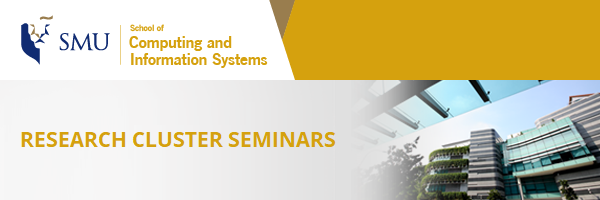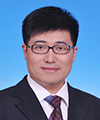| |
 | | Date: | 15 September 2023, Friday | | Time: | 3:30pm to 5:15pm | | Venue: | School of Economics/School of Computing & Information Systems 2, Basement 1, Seminar Room B1-1 |
|

Limited seating. Registration will close on 13 September 2023 or once maximum capacity is reached. Registration is required for attendance. | Research Cluster: Artificial Intelligence & Data Science | | | | Topic: | Trustworthy language agent with knowledge guidance
| | Speaker: | CAO Yixin, Assistant Professor of Computer Science; Lee Kong Chian Fellow
| | Abstract: | Language agent aims to interact with environments and autonomously make decisions in the form of natural language. Various agents are curated for different demands, e.g., tool agent, simulation agent, general agent, domain agent. Large Language Models are becoming the core brain for the agent, as they can not only unify various NLP tasks, but also show various emergent abilities. However, LLMs suffer from serious trustworthiness issues, such as hallucinations, popularity bias, and non-rigorous reasoning. What's worse, their self-calibration abilities are harmed by post-training. Yixin's research interests thus aim to develop trustworthy language agent with knowledge guidance. In specific, there are four aims: 1) understanding LLMs, 2) how to manage knowledge as external memory to verify and correct factual errors (hallucination)? 3) How to leverage prior knowledge in existing tools to avoid long-tail/domain-specific bias? 4) How to learn from structural knowledge towards explainable and rigorous reasoning? Towards this, Yixin will talk about a core problem in LLMs' research: is your prompt optimal to use the knowledge? He will introduce their two recent works as an initial solution. |
|
| | | Research Cluster: Human-Machine Collaborative Systems | | | | Topic: | From Content Understanding to Content Creation
| Speaker:
| HE Shengfeng, Associate Professor of Computer Science
| | Abstract: | A long-standing goal of Computer Graphics is to create high-quality visual content for a variety of applications including games, movies, product design, and engineering simulation. Decades of research have focused on developing tools to simplify such creation workflows. However, the process continues to heavily rely on highly skilled experts creating customized through using extensive manual effort. To achieve a fully-automatic process, it requires two cascaded steps, the understanding of the content and the creation of user-desired effects. In this talk, I will introduce our latest results in these two areas. Specifically, I will discuss how to interpret and utilize the latent space of a generative model. Identifying these semantics not only allows us to better understand the inner working of the deep generative models but also facilitates versatile image editings. I will also talk about the inverse problem (how to invert a given image into the latent code) and reusing the generative model for non-generation tasks. |
|
| | | Research Cluster: Information Systems & Technology | | | | Topic: | Proxy Hunting: Understanding and Characterizing Proxy-based Upgradeable Smart Contracts in Blockchains
| | Speaker: | DUAN Yue, Assistant Professor of Computer Science
| | Abstract: | Upgradeable smart contracts (USCs) have become a key trend in smart contract development, bringing flexibility to otherwise immutable code. However, they also introduce security concerns. On the one hand, they require extensive security knowledge to implement in a secure fashion. On the other hand, they provide new strategic weapons for malicious activities. Thus, it is crucial to fully understand them, especially their security implications in the real-world.
To this end, we conduct a large-scale study to systematically reveal the status quo of USCs in the wild. Our results show that USCs are of great importance to today’s blockchain as they hold billions of USD worth of digital assets. Moreover, our study summarizes eleven unique design patterns of USCs, and discovers a total of 2,546 real-world USC-related security and safety issues in six major categories. |
| | | | | | ABOUT THE SPEAKER(S) | | | |  | Dr. CAO Yixin is an assistant professor with Singapore Management University. Before that, he was a research assistant professor of Nanyang Technology University. He also was a research fellow with NExT++, National University of Singapore (NUS). He received his Ph.D. in Computer Science from Tsinghua University in 2018. His current research interests include NLP and KG, which are highly relevant to the proposed project. He has published over 40 papers at leading conferences and in leading journals, which have received more than 4,500 citations. His papers have been nominated for best paper award in ACL2023 and obtained the frontiers of science award in ICBS2023. He has been awarded Lee Kong Chian Fellowship (2023-2025). He also serves as (senior) area chair for AACL, ACL, and CCL.
| | | |  | Shengfeng HE is an associate professor in the School of Computing and Information Systems, Singapore Management University. He was on the faculty of the South China University of Technology, from 2016 to 2022. He obtained B.Sc. and M.Sc. degrees from Macau University of Science and Technology in 2009 and 2011 respectively, and a Ph.D. degree from City University of Hong Kong in 2015. His research interests include computer vision and generative models. He has published more than 120+ research papers, including 70+ CCF Tier-A papers and 45+ IEEE/ACM Transactions papers, in top venues like TPAMI, IJCV, TOG, CVPR, ICCV, and NeurIPS. He has won awards such as Guangdong Young Top-notch Talents (2018), ACM Guangzhou Star (2019), CCF-Tencent Open Fund Excellence Award (2020), and Guangdong Distinguished Young Scholar (2023). He is a senior member of IEEE and CCF. He serves as the lead guest editor of International Journal of Computer Vision and the associate editor of Neurocomputing.
| | | |  | Yue DUAN is currently an assistant professor of computer science at SMU. Before that, he was a Gladwin Development Chair assistant professor in the CS department at Illinois Institute of Technology. He had postdoctoral training at Cornell University and obtained his Ph.D. in Computer Science from UC Riverside in 2019. His research interests mainly lie in different aspects of Computer Security, including blockchain security, mobile security, software testing, and AI security. His work has been extensively published in top conferences and journals such as ACM CCS, NDSS, USENIX Security and IEEE TDSC. He received multiple awards, including the NSF CRII award, ACM CCS 2022 Best Paper Honorable Mention, and RAID 2019 Best Paper Award. |
| | | | SEMINAR MODERATOR | | |  | NGO Chong Wah
Professor of Computer Science
Director, Human-Machine Collaborative Systems Cluster |
|
|
|
|